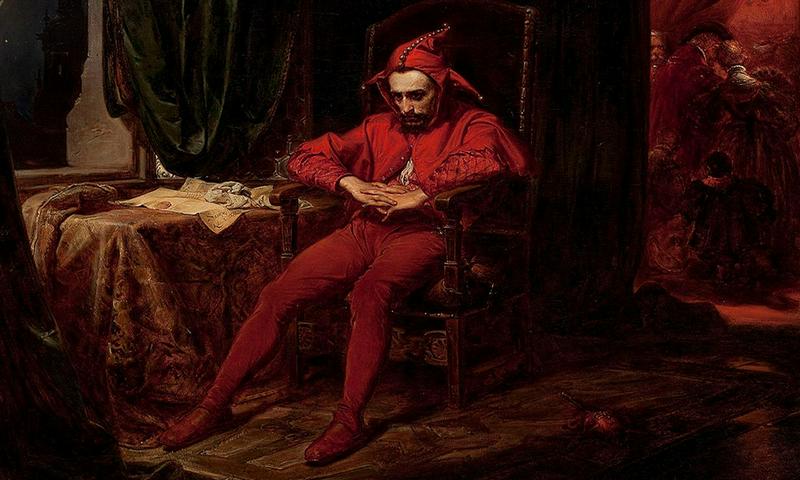What Was It Like To Be A Court Jester?
By Sarah Norman | January 5, 2024
Every Culture Had A Form Of Jester

Throughout history, the role of the court jester has been as diverse as the cultures they served.Jesters entertained and amused the powerful elite across the globe, transcending boundaries and borders.
Whether it was the Egyptian Pharaohs, who relished their wit and humor, or the first Emperor of China, who sought their amusing antics, jesters have held a unique place in the courts of rulers and monarchs. Beyond mere jests and jokes, they were astute observers, often providing candid commentary on the politics and affairs of the day, sometimes even influencing decisions. These colorful characters were not just entertainers; they were the mirrors reflecting the complexities of their respective societies, reminding us that humor, wit, and a bit of irreverence have been cherished commodities in every corner of the world.
Jesters Weren't Always Called Jesters

These merrymakers weren't typically referred to as "jesters" during this era; instead, they often went by monikers like "fool" or "buffoon." It wasn't until the 16th century that the term "jester" emerged, derived from the Anglo-Norman word "gestour," which meant "storyteller." These early entertainers were a far cry from the cap-and-bell-clad buffoons we might picture today. They were clever and cunning, skilled in humor and wit, and served as trusted advisors to royalty, using humor as a potent tool to offer counsel, reflect on the affairs of the realm, and provide amusement to their noble patrons.
Tudor Era Jesters Had It Rough

Jesters, sometimes more formally referred to as "servants," were the quintessential entertainers of their time. Beyond the jingling bells and colorful costumes, they bore the weighty responsibility of messengers, their loyalty tested as they followed their masters to every corner of the kingdom, no matter how perilous the path. Imagine the jesters juggling their way through castle halls, deftly delivering messages, and cleverly intertwining humor with courtly wisdom.
It wasn't all fun and games, though; being a jester sometimes meant walking a tightrope between humor and diplomacy. For some, this path led to prosperity, while others quickly learned that in the world of jesters, the age-old phrase "don't shoot the messenger" could take on a chilling reality.
There Were At Least Two Types Of Jesters

In the world of Medieval courts, two distinct archetypes of court jesters emerged: the revered "Licensed Fool" and the enigmatic "Natural Fool." These jesters were a diverse bunch, often celebrated for their unique qualities, whether it be extreme hunchbacks, twisted limbs, or strikingly unconventional appearances. Dwarfs, too, held a cherished place in the royal entourage.
Remarkably, during the 11th and 12th centuries, the term 'minstrel,' meaning 'little servant,' encompassed a wide array of talents, including musicians, singers, jugglers, magicians, and tumblers. Thus, the court jester donned many hats, or should we say, jests, depending on their individual skills. These jesters, whether they went by 'joculator' or 'joculatrix,' wove laughter and wit into the fabric of court life. Towards the late 12th century, the term 'fool' began its ascent, signifying jesters who had earned their freedom and even lands as payment.
There Was More To The Life Of A Jester Than Simply Jesting

jesters were a jack-of-all-trades, and their duties extended far beyond just making people laugh. While their performances took center stage, they were also the go-to problem solvers, accountable not only to their noble patrons but also to the entire household. From handling the daily shopping and tending to the family's animals to meticulously cataloging the pantry's inventory and managing the welfare of livestock, jesters were the Swiss Army knives of the court. And, of course, they served as the trusty messengers, ensuring that important missives and mail reached their destination without fail. Jesters weren't one-trick ponies either; evidence suggests that those with a multitude of talents earned a king's ransom compared to their single-talented counterparts. Yet, it wasn't all jests and jesting. The life of a jester was a delicate dance of courtly performance, where every show had to be a spectacle, not just an act, for they were at the beck and call of the court's ever-fickle favor, ensuring that their legacy remains a fascinating chapter of history.
Jesting on the Battlefield

In the realm of medieval courts, jesters often found themselves marching onto the battlefield, a place where humor and danger collided with lethal consequences. These intrepid entertainers were more than just messengers; they were couriers of controversy. When tasked with delivering less-than-favorable news, such as land concessions or payments, they bore the brunt of fury, facing the grim reality of the phrase 'kill the messenger.' Back then, it wasn't just a figure of speech; jesters were the living embodiment of it. The ultimate indignity came in the form of trebuchets, catapulting them back to their camp, sometimes minus their heads if the offense was deemed severe.
Battlefield Morale

For those jesters who survived these perilous missions, their duty extended beyond message delivery. They were the morale maestros of the battlefield, lifting spirits with song and dance. As armies squared off, jesters' jokes and jibes would resound, often directed at the opposing side. Occasionally, a hot-headed warrior would take offense and charge the jester instead of the enemy, disrupting the battle's delicate balance.
These jesters were not mere spectators; they were active participants in psychological warfare. Before the battle, they regaled their comrades with tales, songs, and jests to bolster their resolve. As the two opposing forces faced each other, jesters, both on foot and horseback, cavorted between them, easing their own troops' nerves with laughter, bawdy songs, and taunting words. Their mission: to uplift their side and dishearten the enemy. Some even juggled swords and lances, baiting the foe until those with the shortest fuses charged in premature fury, weakening their defensive ranks. The jesters' battlefield antics were like the spirited chants of modern football supporters before a match, a unique blend of humor and heroism that marked them as the unsung heroes of medieval warfare.
Truth To Power

Jester's privilege, a right as remarkable as it is ancient, granted jesters the extraordinary power to jest and jeer with impunity, a privilege marked by their symbolic regalia—the cap adorned with bells and the marotte scepter, echoing the monarch's crown and scepter. This whimsical authority allowed jesters to speak candidly, a privilege not to be taken lightly.
Even luminaries like Martin Luther sought refuge in jest, employing humor as a weapon to challenge the mighty. In his address, "To the Christian Nobility of the German Nation," Luther humorously dubbed himself a court jester, a disguise that allowed him to defy the established order. Later, he invoked the jester's privilege with daring audacity, asserting that even monks should dare to break their chastity vows, proving that laughter could indeed be a potent tool in challenging authority and reshaping society.
The Jester Role Faded Out During The Restoration Era

As the Elizabethan era dawned, the role of the jester embarked on a transformative journey. No longer confined to the halls of noble houses, jesters found themselves center stage, treading the boards as comic actors. Yet, as the 17th century unfurled its pages, a shadow of danger loomed over those who sought royal patronage. The Restoration era under Charles II signaled a subtle shift; while the traditional court jester was not reinstated, the theater and proto-music hall entertainments thrived, with Thomas Killigrew at the forefront. Although not officially a jester, Killigrew wielded a unique power—Samuel Pepys, in his iconic diary, christened him "The King's fool and jester," granting him the authority to mock and jest with impunity, even at the expense of the most prominent figures (12 February 1668).
The Shakespearian Fool

Shakespeare, the bard of Avon, wielded his quill like a jester's marotte, giving life to the enduring image of the Shakespearean fool. These clever commoners, brought to vivid life upon the stage, used their wit to outshine the lofty lords and ladies of the time, echoing the antics of real-life jesters with their jests elevated to theatrical heights. The "groundlings," those who could not afford grand seats and thus stood near the stage, were particularly drawn to these Shakespearean jesters. However, the nobility, including none other than Queen Elizabeth I herself, found great delight in the portrayals of these witty actors. One such actor, Richard Tarlton, won the Queen's admiration. Yet, it wasn't just Shakespeare's genius at play; actor Robert Armin, a vital collaborator, breathed life into the Shakespearean fool, ensuring that the legacy of jesters lived on, both on and off the stage. Shakespeare's immortal words gave jesters a lasting place in the world's heart, where their jests still echo through the ages.

